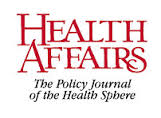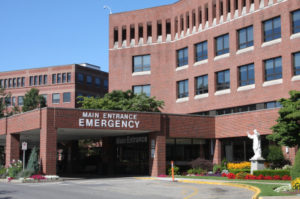Medicaid Expansion Brings Improvements to Expansion States
States that expanded their Medicaid programs under the Affordable Care Act have experienced fewer hospital admissions, shorter lengths of stays in the hospital, and lower hospital costs, according to a new Health Affairs study.
 Specifically, they experienced:
Specifically, they experienced:
- a 3.1 percent decline in inpatient days
- a 3.5 percent decrease in discharges for conditions considered “ambulatory care-sensitive,” such as diabetes, chronic respiratory problems, and pneumonia
- a reduction of nearly three percent in hospital costs.
Pennsylvania is one of those expansion states, and Medicaid expansion has greatly enhanced the ability of Pennsylvania safety-net hospitals to serve their communities.
Learn more about how Medicaid expansion has improved the health of the population in states that expanded their Medicaid programs in the Health Affairs study “Medicaid Expansion Associated With Reductions in Preventable Hospitalizations.”
 The Medicaid DSH cut was included in the 2010 health care reform law in anticipation of a great reduction in the number of uninsured people leaving hospitals providing much less uncompensated care and therefore not in need of as much DSH money. The law’s reach has not proven to be as great as anticipated, however, and two developments since the law’s passage have put a damper on the expected rise in the number of insured Americans: a court decision that made it optional for states to expand their Medicaid program and the repeal of the requirement that everyone purchase health insurance.
The Medicaid DSH cut was included in the 2010 health care reform law in anticipation of a great reduction in the number of uninsured people leaving hospitals providing much less uncompensated care and therefore not in need of as much DSH money. The law’s reach has not proven to be as great as anticipated, however, and two developments since the law’s passage have put a damper on the expected rise in the number of insured Americans: a court decision that made it optional for states to expand their Medicaid program and the repeal of the requirement that everyone purchase health insurance. The Philadelphia Business Journal reports that since Hahnemann’s closing was announced during the summer, ER volume has risen 15 percent, admissions have risen 12 percent, and births have risen more than 50 percent at Thomas Jefferson University Hospital, a SNAP member. Meanwhile, SNAP member Pennsylvania Hospital has seen its ER visits rise nine percent, SNAP member Penn Presbyterian Medical Center has seen its ER volume increase five percent, and SNAP member the Hospital of the University of Pennsylvania has seen its ER volume rise five percent.
The Philadelphia Business Journal reports that since Hahnemann’s closing was announced during the summer, ER volume has risen 15 percent, admissions have risen 12 percent, and births have risen more than 50 percent at Thomas Jefferson University Hospital, a SNAP member. Meanwhile, SNAP member Pennsylvania Hospital has seen its ER visits rise nine percent, SNAP member Penn Presbyterian Medical Center has seen its ER volume increase five percent, and SNAP member the Hospital of the University of Pennsylvania has seen its ER volume rise five percent. This area is served almost exclusively by Pennsylvania safety-net hospitals and recently suffered a major loss when one of those providers, Hahnemann University Hospital, closed its doors.
This area is served almost exclusively by Pennsylvania safety-net hospitals and recently suffered a major loss when one of those providers, Hahnemann University Hospital, closed its doors.  Instead, patients previously served by Hahnemann University Hospital, a Pennsylvania safety-net hospital that served especially large numbers of Medicaid and uninsured patients, are now being served by other safety-net hospitals in Philadelphia: mostly, Jefferson Health, the University of Pennsylvania Health System, Einstein Healthcare Network, and Temple University Hospital. All report increased volume in their emergency rooms, more ambulance arrivals, and more inpatient admissions, but at least so far, they also report that they are comfortably handling the increased patient volume created when Hahnemann closed its emergency room and discharged its last patients in July.
Instead, patients previously served by Hahnemann University Hospital, a Pennsylvania safety-net hospital that served especially large numbers of Medicaid and uninsured patients, are now being served by other safety-net hospitals in Philadelphia: mostly, Jefferson Health, the University of Pennsylvania Health System, Einstein Healthcare Network, and Temple University Hospital. All report increased volume in their emergency rooms, more ambulance arrivals, and more inpatient admissions, but at least so far, they also report that they are comfortably handling the increased patient volume created when Hahnemann closed its emergency room and discharged its last patients in July. Cuts in Medicaid disproportionate share hospital (Medicaid DSH) allotments to states were mandated by the Affordable Care Act based on the expectation that the law would greatly reduced the number of uninsured Americans. While this has been the case, the decline in the number of uninsured has not been as great as expected. For this reason, Congress has on several occasions delayed the required Medicaid DSH cut.
Cuts in Medicaid disproportionate share hospital (Medicaid DSH) allotments to states were mandated by the Affordable Care Act based on the expectation that the law would greatly reduced the number of uninsured Americans. While this has been the case, the decline in the number of uninsured has not been as great as expected. For this reason, Congress has on several occasions delayed the required Medicaid DSH cut. The new Department of Homeland Security regulation, while focused on applicants for entry into the U.S., could have the unintended effect of discouraging legal immigrants from enrolling in Medicaid, CHIP, and other government programs and even lead them to disenroll from such programs out of a mistaken concern that participating in such programs could jeopardize their status as legal immigrants. The Kaiser Family Foundation, in fact, estimates that two to three million people will leave Medicaid and CHIP because of the new regulation.
The new Department of Homeland Security regulation, while focused on applicants for entry into the U.S., could have the unintended effect of discouraging legal immigrants from enrolling in Medicaid, CHIP, and other government programs and even lead them to disenroll from such programs out of a mistaken concern that participating in such programs could jeopardize their status as legal immigrants. The Kaiser Family Foundation, in fact, estimates that two to three million people will leave Medicaid and CHIP because of the new regulation.